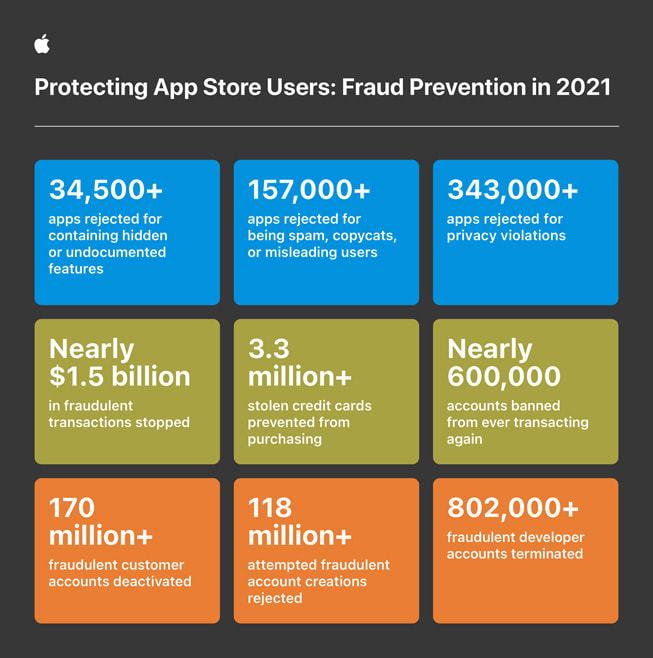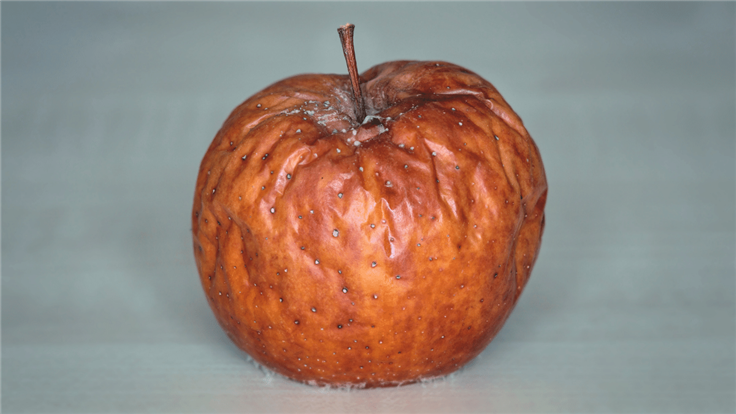Apple’s App Review process may have received ill wishes from many benevolent developers, but Apple has now revealedhow effective it is and why it is so stringent.
According to its review of the year 2021, Apple protected customers from nearly $1.5 billion in potentially fraudulent transactions, and stopped over 1.6 million risky and vulnerable apps and app updates from defrauding users.
Bad apples
In 2021, Apple rejected or removed over 835,000 problematic new apps, and an additional 805,000 app updates. Some were removed because they were found to be unfinished or contained bugs that impeded functionality, others because they needed improvements in their moderation mechanisms for user-generated content.
The App Review team also rejected over 343,000 apps for requesting more user data than necessary or mishandling the data they already collected.
To put these numbers in perspective, 107,000 new developers managed to get their apps onto the store. Some of which may have gone through rejection on earlier occasions, but received a stamp of approval in the end.

Rotten apples
Over the same year, the App Review team rejected more than 34,500 apps for containing hidden or undocumented features. They also rejected upward of 157,000 apps because they were found to be spam, copycats, or misleading to users, for example, by manipulating them into making a purchase.
Also, Apple removed over 155,000 apps from the App Store because the developers altered the concept or functionality of the app after receiving approval at first. Altering the app after release is a method threat actors can use to try and bypass the App Review process.
Fraudulent accounts
When developer accounts are used for fraudulent purposes, the offending developer’s Apple Developer Program account and any related accounts are terminated.
As a result of these efforts, Apple terminated over 802,000 developer accounts in 2021. Apple rejected an additional 153,000 developer enrollments over fraud concerns, preventing these threat actors from ever submitting an app to the store.
Financial fraud
Using both human and tech review, Apple stopped more than 3.3 million stolen cards from being used to make potentially fraudulent purchases. Nearly 600,000 accounts were banned from ever transacting again. In total, Apple protected users from nearly $1.5 billion in potentially fraudulent transactions in 2021.
User concerns
If users have concerns about an app, they can report it by clicking on the Report a Problemfeature on the App Store or calling Apple Support, and developers can use either of those methods or additional channels like Feedback Assistantand Apple Developer Support.
As part of the App Review process, any developer who feels they have been incorrectly flagged for fraud may file an appeal to the App Review Board.
Passwords
Apple also announced at its annual Worldwide Developers Conference (WWDC)that it will introduce support for third-party two-factor authentication apps with the built-in Passwords feature in the Settings app.
iOS 16, which is expected to be released in September 2022, will permit users to edit strong passwords suggested by Safari to adjust for site‑specific requirements.
Apple also confirmed it’s bringing support for passkeys in the Safari web browser, a next-generation passwordless sign-in standard that allows users to log in to websites and apps across platforms using Touch ID or Face ID for biometric verification.
Passkeys never leave your device and are specific to the site you created them for. Which makes phishing for them almost impossible. The passkey mechanism was established by the FIDO Alliance and is already backed by Google and Microsoft. As such, it aims to replace standard passwords by providing unique digital keys stored locally on the device.











